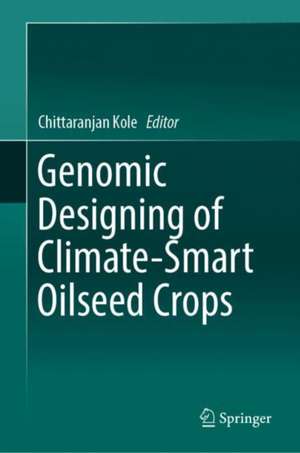Genomic Designing of Climate-Smart Oilseed Crops
Editat de Chittaranjan Koleen Limba Engleză Hardback – mar 2019
Spectacular achievements in the fields of molecular breeding, transgenics and genomics in the last three decades have facilitated revolutionary changes in oilseed- crop-improvement strategies and techniques. Since the genome sequencing of rice, as the first crop plant, in 2002, the genomes of about one dozen oilseed crops have been sequenced and more are to follow. This has made it possible to decipher the exact nucleotide sequence and chromosomal positions of agroeconomic genes. Most importantly, comparative genomics and genotyping-by-sequencing have opened up new vistas for exploring available biodiversity, particularly of wild crop relatives, for identifying useful donor genes.
Preț: 961.55 lei
Preț vechi: 1172.62 lei
-18% Nou
Puncte Express: 1442
Preț estimativ în valută:
184.01€ • 199.81$ • 154.57£
184.01€ • 199.81$ • 154.57£
Carte tipărită la comandă
Livrare economică 22 aprilie-06 mai
Preluare comenzi: 021 569.72.76
Specificații
ISBN-13: 9783319935355
ISBN-10: 3319935356
Pagini: 569
Ilustrații: XXV, 498 p. 35 illus., 23 illus. in color.
Dimensiuni: 155 x 235 x 33 mm
Greutate: 0.91 kg
Ediția:1st ed. 2019
Editura: Springer International Publishing
Colecția Springer
Locul publicării:Cham, Switzerland
ISBN-10: 3319935356
Pagini: 569
Ilustrații: XXV, 498 p. 35 illus., 23 illus. in color.
Dimensiuni: 155 x 235 x 33 mm
Greutate: 0.91 kg
Ediția:1st ed. 2019
Editura: Springer International Publishing
Colecția Springer
Locul publicării:Cham, Switzerland
Cuprins
Climate-smart Soybean.- Dissection of drought tolerance traits in oilseed rape (Brassica napus L).- Climate-smart groundnuts.- Possibilities of adaptation of sunflower to climate chang.- Rape and Mustard for sustainable oilseed production.- Climate-smart Sesame.- Climate-Castor bean.- Climate-smart Flax.
Notă biografică
Prof. Chittaranjan Kole is an internationally reputed scientist with an illustrious professional career spanning over thirty-four years with original contributions in the fields of plant genetics, genomics, and molecular breeding leading to the publication of more than 140 research articles. He has edited over 90 books for leading publishers of the world including Springer Nature, Wiley-Blackwell and Taylor and Francis Group. His works and editing acumen have been appreciated worldwide by several pioneering scientists, including seven Nobel Laureates, for their impact on science and society. Prof. Kole is also the group leader of the International Climate-Resilient Crop Genomics Consortium and the International Consortium on Phytomedomics and Nutriomics.
Textul de pe ultima copertă
This book highlights modern strategies and methods to improve oilseed crops in the era of climate change, presenting the latest advances in plant molecular breeding and genomics-driven breeding.
Spectacular achievements in the fields of molecular breeding, transgenics and genomics in the last three decades have facilitated revolutionary changes in oilseed- crop-improvement strategies and techniques. Since the genome sequencing of rice, as the first crop plant, in 2002, the genomes of about one dozen oilseed crops have been sequenced and more are to follow. This has made it possible to decipher the exact nucleotide sequence and chromosomal positions of agroeconomic genes. Most importantly, comparative genomics and genotyping-by-sequencing have opened up new vistas for exploring available biodiversity, particularly of wild crop relatives, for identifying useful donor genes.
Spectacular achievements in the fields of molecular breeding, transgenics and genomics in the last three decades have facilitated revolutionary changes in oilseed- crop-improvement strategies and techniques. Since the genome sequencing of rice, as the first crop plant, in 2002, the genomes of about one dozen oilseed crops have been sequenced and more are to follow. This has made it possible to decipher the exact nucleotide sequence and chromosomal positions of agroeconomic genes. Most importantly, comparative genomics and genotyping-by-sequencing have opened up new vistas for exploring available biodiversity, particularly of wild crop relatives, for identifying useful donor genes.
Caracteristici
Highlights the latest advances in plant molecular mapping and genome sequencing Demonstrates how advances in plant molecular breeding and genomics-assisted breeding can help produce oilseed crops that can adapt to climate change Written by leading experts in the field
